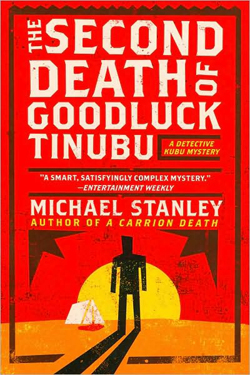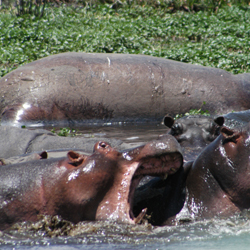
A safari camp, whether in Tanzania like ours or in Botswana like Stanley’s, makes a great setting for a mystery. The structure of Stanley’s book is as classic as a British mystery from Agatha Christie’s era. His Jackalberry Camp is even situated on an island. Remember And Then There Were None?
When Goodluck Tinubu is viciously murdered in his tent, Jackalberry Camp is thrown into an uproar. Investigating the murder, police are startled to discover that their victim was thought to have died thirty years earlier—during the civil war in neighboring Zimbabwe. Obviously there’s been some confusion and now he’s been killed for real. Who among the guests or staff at the camp could have done it?

Morné du Pisanie, the camp’s second-in-command, seems to be a hail-fellow-well-met sort, regaling the guests with stories as he tends bar every night. But he looks back fondly on his days with the Selous Scouts, which supported white rule in neighboring Zimbabwe, and his connection with the camp’s owner is hard to fathom. Suthani Moremi, the cook, seems to live in a world of his own, his main companionship provided by Kweh, his pet go-away-bird. But is his eccentricity intended to deflect suspicion? Salome McGlashan, the camp’s owner, also from Zimbabwe, is haunted by the ghosts of the past. Did she recognize Goodluck Tinubu as one of the ghosts when he checked in? And did she have a reason to want him dead?

Mystery fans will recognize that Michael Stanley is not the first to set a mystery series in Botswana. Alexander McCall Smith’s No. 1 Ladies Detective Agency series takes place in that southern African country as well. And fans of McCall Smith will know that Botswana counts as one of modern Africa’s success stories: politically stable and with an economy that assures decent lives for its citizens.
Michael Stanley’s vision is darker than McCall Smith’s—for one thing his sleuth is a police officer, so his work load often includes investigating murders. But Stanley’s portrait of Botswana echoes that of McCall Smith, a gentle world populated by gentle people. An uncharitable critic could even say that Detective Kubu verges too close to the whimsy that some find cloying in McCall Smith’s Mma Ramotswe.

Zimbabwe—once Rhodesia—is right next door to Botswana. From 1965 to 1979 the country was in the grip of a war that sought to redress the inequities created by white rule and that put Robert Mugabe in power, where he remains to this day. The black freedom fighters—or terrorists—depending on which side one was on, seized the farms of white settlers, murdering, raping, and mutilating the owners in the process. Though the war ended in 1979, the unrest has continued and the country has suffered economically for decades. Zimbabwe once supplied its own food needs and actually exported food. Now its starving and miserable citizens seek refuge in neighboring countries, and white settlers continue to lose the land they have farmed successfully for generations.
The solution to the mystery leads Kubu deep into a plot with serious geopolitical repercussions. As he works to solve the complicated case that begins with the murder of Goodluck Tinubu, Kubu travels to Bulawayo, the capital of Zimbabwe. He laments the contrast between this sad land with its worthless currency, poverty, and disorder and his own peaceful Botswana. But he manages to enlist the Bulawayo police in helping him with his case, in a way that makes us respect both him and his Zimbabwean counterparts for their devotion to policing, regardless of the political climate in their respective countries.
Ultimately, The Second Death of Goodluck Tinubu is a fascinating and very successful fusion of traditional whodunit and novel of international intrigue.
[Photos courtesy of the author, from her own trip to Tanzania.]
Peggy Ehrhart is the author of the Maxx Maxwell mysteries, featuring blues-singer sleuth Elizabeth “Maxx” Maxwell. Visit Peggy on the web at www.PeggyEhrhart.com.
